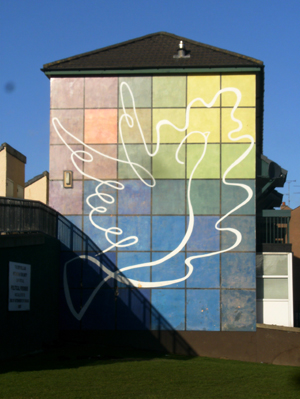Recently a music video came out that gave me pause for thought. I don’t usually delve too deeply into the meanings of current pop videos, but it is all Rihanna’s fault. Now, I will admit that I am a huge fan of Rihanna, but until recently she hasn’t been the cause of any intellectual stimulation in my life. This changed when she recently filmed her video in Northern Ireland. It was the location of this video tied to the main line of the song – “We found love in a hopeless place” – that made me pause.

Sara O'Neill
I don’t think Rihanna meant to give the message that Northern Ireland was a hopeless place by filming there; it was probably just a convenient location.
The reason that I had to stop and think about the combination of the video and song lyrics was that I spent last spring studying in Northern Ireland, and I found hope there. Like every other country, Northern Ireland is not perfect, but it is definitely not hopeless. Hope is a word that means a lot in the context of a place such as Northern Ireland given the country’s troubled history and still sometimes difficult present.
Last spring I was able to study in Northern Ireland through a program with HECUA, which is an acronym for the Higher Education Consortium for Urban Affairs, an off-campus study provider with a focus on social justice.
The program focused on the history of Northern Ireland and the conflict that took place from 1969 to 1998. We learned about the political, historical, and religious roots that motivated the conflict. After gaining an understanding of this, we looked at how Northern Ireland made the transition from a society in conflict to a post-conflict society working toward creating a sustainable and peaceful democracy. We studied these themes through a variety of methods. We had classes, independent study, seminars that met with community workers, politicians and a variety of others, and internships in organizations working to create change in Northern Ireland and abroad.

With a photograph of this mural in Derry/Londonderry, Northern Ireland, HECUA’s Sara O’Neill won second place and an honorable mention earlier this year in the International Education Center's annual photo contest.
I learned that Northern Ireland faces a lot of challenges. There are still issues of sectarianism, lingering fear and hurt, poverty, unemployment and distrust. Luckily, Northern Ireland also has a lot going for it. Traveling in Belfast, Derry/Londonderry and rural areas of Northern Ireland gave me a view of a naturally beautiful country with revitalized cities and towns. More important than this, the people I met were inspirational and motivated. There are countless people working through different means to create a new Northern Ireland where everyone is recognized as an important part of society and can coexist – a place where there isn’t just an absence of violence, but a sense of peace.
Seeing people from different backgrounds working for this goal was nothing but hopeful. There are so many people that showed love for each other and faith for their future. Because of this, I cannot see Northern Ireland as a hopeless place since that would mean that people no longer have the ability to dream or believe in a better future.
As I’ve returned home, I have tried not to lose this sense of hope because it is a feeling that is not only needed in places such as Northern Ireland, but it is needed here, too. We have our own issues in society to face and to reform and we will need the ability to dream and believe in a better future for everyone here as well. The time that I spent in Northern Ireland taught me that there is no room for apathy and that everyone has the ability to contribute as long as there is hope in a better future.
I would like to share a part of a poem by Seamus Heaney that I often heard while abroad that can sum up my feelings on change and the future much more eloquently than I can.
From: "The Cure at Troy"
History says, don’t hope
On this side of the grave.
But then, once in a lifetime
the longed for tidal wave
of justice can rise up,
and hope and history rhyme.
So hope for a great sea change
on the far side of revenge.
Believe that a further shore
is reachable from here.
~Seamus Heaney
If anyone would like to know about HECUA’s program in Northern Ireland or other locations, feel free to email Sara O’Neill or visit the CILCE Center in Room 153, Murray-Herrick Campus Center.






